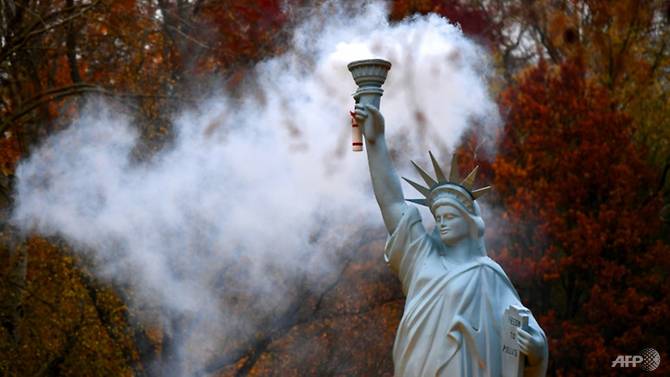UN climate talks wrap up as US stands firm on fossil fuels
 |
| A smoking replica of the Statue of Liberty by Danish artist Jens Galschiot at a park in Bonn during UN climate talks, slowed down by the United States' defence of the use of fossil fuels. (Photo: AFP/Patrik Stollarz) |
Envoys from nearly 200 countries, including delegates from Washington, gathered for the conference in Bonn to negotiate a rulebook, to be adopted next year, for enacting the global deal reached to cheers and champagne in 2015.
Delegates reported mixed progress in Germany, with the reemergence of divisions between rich and developing countries.
A key stumbling block was on finance for the world's poorer nations to help them prepare for and deal with the fallout from climate change, including more frequent and severe superstorms, droughts and land- and crop-gobbling sea level rises.
Another obstacle was the insistence of developed nations - led by the US - that all countries share similar obligations under the Paris pact, while developing greenhouse gas polluters want a certain degree of leeway.
The conference from Nov 6 to 17 is the first of the UN's climate body since President Donald Trump announced in June that the US will withdraw from the agreement championed by his predecessor Barack Obama.
The rules determine it can only leave in November 2020, and in the meantime, Washington continues to fill its seat at the climate talks.
"The stars are not well aligned since Trump's exit" from the pact, Seyni Nafo, a negotiator for African nations, told AFP of the talks.
"It's like the heart wasn't there. The position of the United States influences other developed countries, which in turn has consequences for the positions major developing nations adopt. It's a game of wait-and-see."
Not helping the mood, White House officials hosted a sideline event with energy company bosses Monday to defend the continued use of fossil fuels - coal, oil and natural gas blamed for emitting planet-warming gases into the Earth's atmosphere.
At its very essence, the Paris Agreement seeks a drawdown of carbon emissions.
The pact commits countries to limiting average global warming to under two degrees Celsius over Industrial Revolution levels, and 1.5 Celsius if possible, to avert worst-case-scenario climate change.
"RIDICULOUS"
Nations submitted voluntary emissions-cutting commitments to bolster the deal, but scientists say the pledges place the world on course for warming of 3 Celsius or more.
How, and when, to update country commitments to bring them in line with the 2 Celsius target, is a central topic in the ongoing negotiations.
"Our task has been made all the more difficult with the disengagement of the world's largest historic emitter from the Paris Agreement," Maldives environment minister Thoriq Ibrahim told delegates Thursday on behalf of the Alliance of Small Island States at the forefront of climate change-driven sea-level rises.
The Trump administration insisted, however, that it was "committed" to limiting greenhouse gas emissions - as long as this does not threaten energy security or the economy.
Acting assistant secretary of state Judith Garber told the conference that the US would "support the cleanest, most efficient power generation, regardless of the source".
An Obama-era official who helped deliver the Paris agreement - a feat that took more than two decades of tough negotiations - lashed out at Trump's "wrongheaded" decision to withdraw from the pact.
"Climate change is a huge challenge, we all know that," Todd Stern, who was Obama's special envoy for climate change, told AFP on the sidelines of the conference he attended as an observer. He left government in 2016.
"Trying to say it's a hoax, or it doesn't mean anything, or it's a terrible agreement and the rest of the world is laughing at us, is just so ... ridiculous," he said - citing some of Trump's stated reasons.
The United States is the world's biggest historical greenhouse gas polluter, and second only to China for current-day emissions.
The negotiations will carry on without the US, and nations and businesses will continue moving away from fossil fuels, said Mohamed Adow of Christian Aid, which represents poor country interests at the talks.
He pointed to a coal phase-out initiative launched in Bonn Thursday with the backing of 20 countries - led by Britain and Canada.
"But what we have lost is the diplomatic leadership of the US in driving the process," added Adow.
"We are missing the old US administration in lining up the politics."
What the stars mean:
★ Poor ★ ★ Promising ★★★ Good ★★★★ Very good ★★★★★ Exceptional
Latest News
More News
- 72 nations sign landmark Hanoi cybercrime convention (October 26, 2025 | 18:00)
- UN Secretary-General commends Vietnam’s global leadership (October 26, 2025 | 09:00)
- APEC finance ministers convene to tackle regional challenges (October 22, 2025 | 17:31)
- Rewiring global trade: ASEAN’s rise as supply chain hub (October 17, 2025 | 11:40)
- Vietnam attends first World Nuclear Week Forum in Russia (September 26, 2025 | 10:50)
- Vietnam attends 69th session of IAEA General Conference (September 16, 2025 | 10:00)
- ADB, WB pledge over 12 billion USD for ASEAN power grid, renewable energy projects (August 15, 2025 | 14:18)
- Lowy Institute proposes AI-based tobacco control solutions for ASEAN (August 15, 2025 | 14:14)
- Cloud computing policy to position Malaysia as regional hub by 2030 (August 15, 2025 | 14:11)
- Thailand, Cambodia suffer numerous cyber attacks (August 05, 2025 | 16:19)


















 Mobile Version
Mobile Version